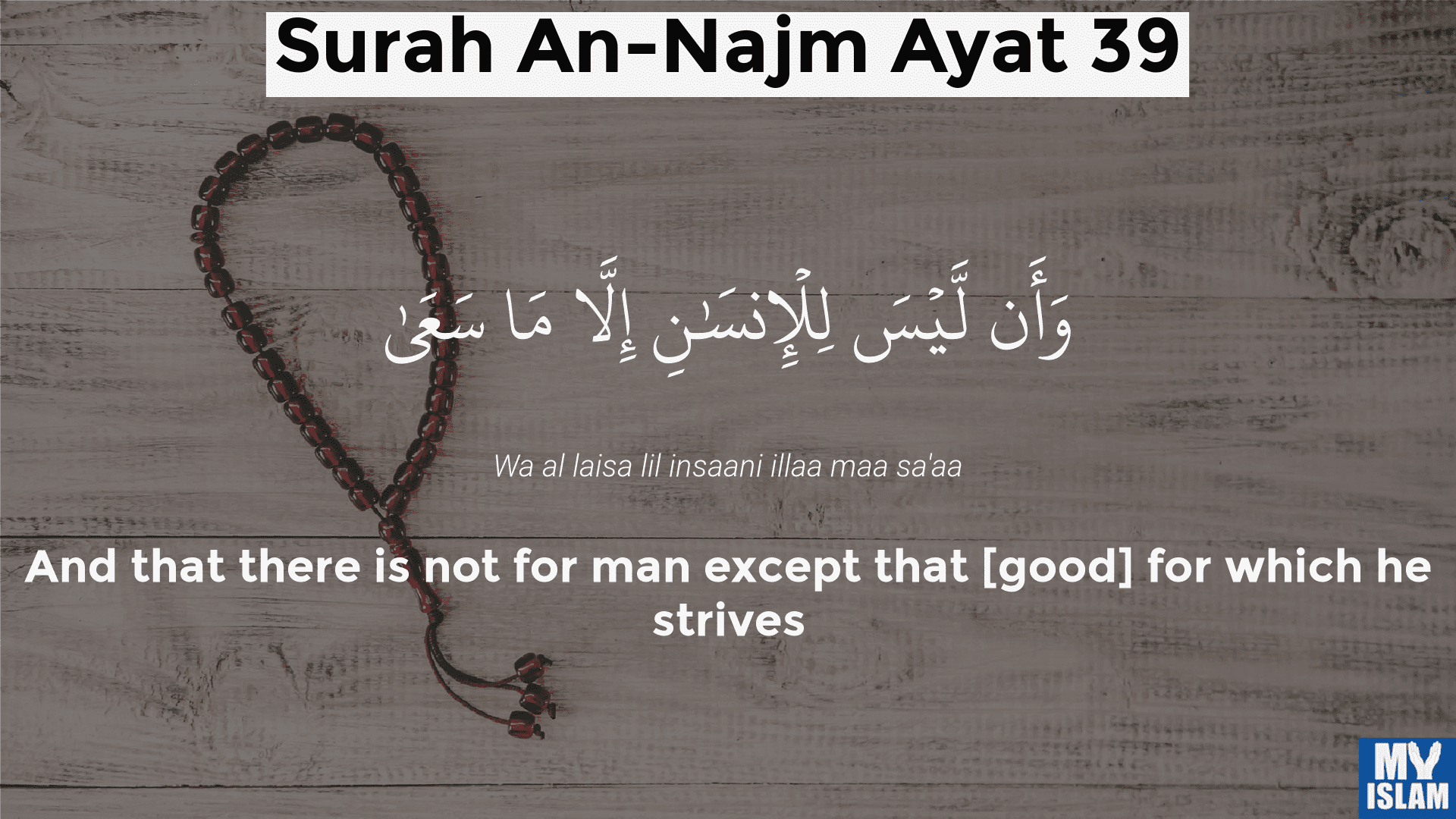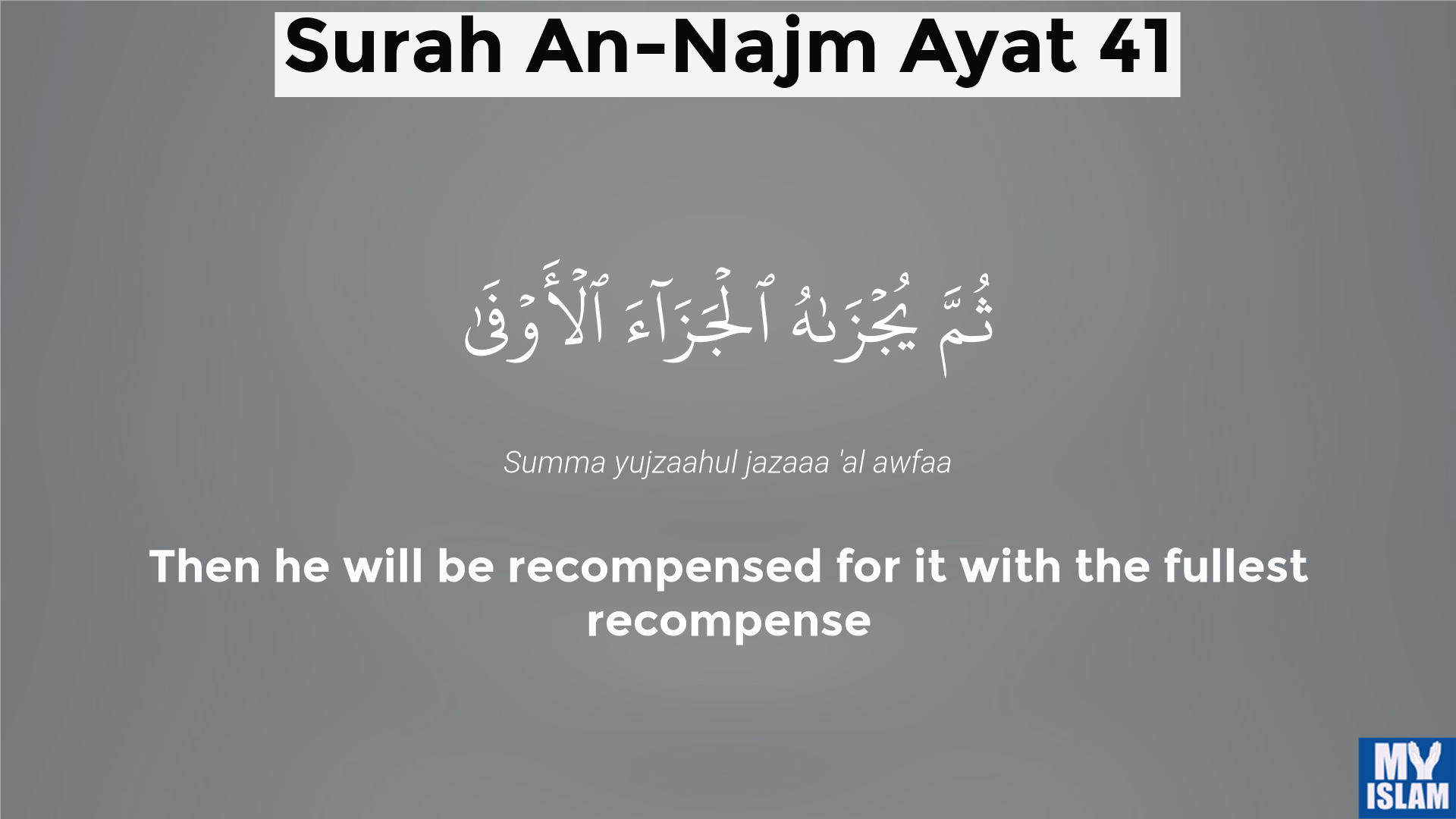Surah Najm Ayat 39 in Arabic Text
English Translation
Here you can read various translations of verse 39
And that there is not for man except that [good] for which he strives
That man can have nothing but what he strives for;
and that man shall have nothing but what he has striven for,
And that man can have nothing but what he does (good or bad).
And that man hath only that for which he maketh effort,
And that man will have nothing except that for which he has endeavored (to achieve);
that man will only have what he has worked towards;
اور یہ کہ ہر انسان کے لیے صرف وہی ہے جس کی کوشش خود اس نے کی
Quran 53 Verse 39 Explanation
For those looking for commentary to help with the understanding of Surah Najm ayat 39, we’ve provided two Tafseer works below. The first is the tafseer of Abul Ala Maududi, the second is of Ibn Kathir.
Ala-Maududi
(53:39) and that man shall have nothing but what he has striven for,[38]
38. From this verse also three important principles are derived:
(1) That every person will get only the fruit of his own deeds.
(2) That the fruit of one man’s deeds cannot be given to another unless he has a share in that deed.
(3) That none can attain anything without striving for it.
Some people wrongly apply these three principles to the economic problems of the world and conclude that no person can become the lawful owner of anything except of his own earned income. But this conclusion clashes with several laws and injunctions given by the Quran itself, e.g. the law of inheritance, according to which many individuals inherit a person and are regarded as his lawful heirs, whereas the heritage is not their earned income. As for a suckling for instance, it cannot be proved by any stretch of imagination that its labor had any share in the wealth left by its father. Likewise, there are the injunctions about the zakat and voluntary charities according to which the wealth of one man is transferred to others only on the basis of their legal and moral entitlement and they become its lawful owners, whereas in the production of this wealth they did not make any contribution at all. Thus, it is against the intention of the Quran to take a verse of it and derive from it such conclusions as clash with the other teachings of the Quran itself.
Some other people regard these principles as concerning the Hereafter and raise the question whether, according to these principles, the deeds of one man can in some way be also beneficial for the other person, and whether the deeds of a person which he does for another person, or on his behalf, can be accepted from him, and whether it is also possible that a person may transfer the reward of his act to another. If the answer to these questions be in the negative, the sending of spiritual rewards (isal thawab) for the dead and performing Hajj on behalf of another, would be inadmissible; even the prayer of forgiveness for the other person would be meaningless, for this prayer also is not the concerned person’s own act and deed. However, this extreme point of view has been adopted by none among the followers of Islam except the Mutazilites. Only they take this verse in the meaning that one man’s acts and deeds can in no case be beneficial for the other. On the contrary, the followers of the sunnah are unanimous that the prayer of one man is beneficial for the other because it is confirmed by the Quran; however, they differ only in details, and not in principles, as to whether the sending of spiritual rewards for another and doing a good work on behalf of another is beneficial or not.
(1) The term isal-thawab means that after a person has performed a good act, he may pray to Allah to grant its rewards to another. In this regard, Imam Malik and Imam Shafei have expressed the opinion that the rewards of the pure bodily acts of worship, e.g. the Prayer, the Fasting and recitals of the Quran, etc. cannot reach the other person; however, the rewards of one’s monetary acts of worship, e.g. charities, or Hajj, which is a combination of the monetary and bodily worships, can reach the other, for the principle is that one man’s act should not be beneficial for the other. But since according to authentic Ahadith the rewards of charities can be conveyed, and Hajj on behalf of another also can be performed, they admit the permissibility of conveying of rewards to the extent of this kind of the acts of worship only. On the contrary, the Hanafi viewpoint is that a man can send the reward of each of his virtuous acts as a gift to the other, whether it is the Prayer, or the Fast, or the recitation of the Quran, or remembrance of Allah, or charity, or Hajj and Umrah. The argument is that just as a man after carrying out a piece of work can tell the master to pay the wages to such and such other person instead of him, so after performing a good deed also he can pray to Allah to grant its rewards to such and such other person instead of him. In this there is no rational ground for making exception of some kinds of virtues and keeping it restricted to some other kinds of virtues. The same is confirmed by a large number of the traditions:
A tradition, on the unanimous authority of Aishah, Abu Hurairah, Jabir bin Abdullah. Abu Rafi, Abu Talhah Ansari and Hudhaifah bin Usaid al-Ghifari has been reported in Bukhari, Muslim. Musnad Ahmad, Ibn Majah, Tabari, in Awsat, Musradrik and Ibn Abi Shaibah, saying that the Prophet (peace be upon him) got two rams and sacrificed one on behalf of himself and his family and the other on behalf of his ummah.
Muslim, Bukhari, Musnad Ahmad, Abu Daud and Nasai have related a tradition from Aishah to the effect that a person said to the Prophet (peace be upon him): My mother has died suddenly. I think if she had a chance to speak, she would have asked me giving away something in charity. Now, if I give away something in charity on her behalf, will she get a reward for it? The Prophet (peace be upon him) replied: Yes, she will.
In Musnad Ahmad there is a tradition from Abdullah bin Amr bin Aas to the effect, that his grandfather, Aas bin Wail, had vowed in the pre Islamic days of ignorance to sacrifice 100 camels. His uncle, Hisham bin Aas, sacrificed fifty camels of his own share. Amr bin Aas, asked the Prophet (peace be upon him) as to what he should do. The Prophet (peace be upon him) replied: If your father had affirmed faith in the Oneness of God, you may observe fasts on his behalf or give something in charity, this would be beneficial for him.
A tradition has been reported in Musnad Ahmad, Abu Daud, Nasai and Ibn Majah, on the authority of Hasan Basri, to the effect that Saad bin Ubadah asked the Prophet (peace be upon him): My mother has died. Should I give something in charity on her behalf? The Prophet (peace be upon him) replied in the affirmative. Several other traditions bearing on the same subject also have been related in Bukhari, Muslim, Musnad Ahmad, Nasai, Tirmidhi, Abu Daud, Ibn Majah, etc. on the authority of Aishah, Abu Hurairah and Ibn Abbas. According to which the Prophet (peace be upon him) permitted giving away of something in charity on behalf of the deceased person describing it as beneficial for him.
According to Daraqutni, a person said to the Prophet (peace be upon him): I have been serving my parents while they were alive, what should I do now when they are dead? The Prophet (peace be upon him) replied: This would also be their service if you offered the Prayer on their behalf along with your own Prayers, and observed the Fast on their behalf along with your own Fast. Another tradition in Daraqutni has been related from Ali according to which the Prophet (peace be upon him) said: If a person passing by the graveyard recites: Qul huwallahu ahad eleven times and gives away its reward for the dead, all the dead ones will be granted their due shares of the rewards.
This large number of the traditions which support one another explicitly state that the transfer of the spiritual rewards is not only possible but rewards of all kinds of acts of worship and virtuous deeds can be sent and conveyed and in it there is no specification of any particular kind of acts and deeds. In this connection, however, four things should be understood well:
First, that the reward of that act only can be transferred, which may have been performed purely for the sake of Allah and according to the Shariah injunctions; otherwise obviously an act which is performed for the sake of another than Allah, or in contravention of the Shari ah injunctions, cannot even entitle its doer himself to any reward, nothing to say of its transfer to another person.
Secondly, the gift of the rewards will certainly reach to those righteous persons who are staying as guests with Allah, but no rewards are expected to reach to those culprits who are placed in confinement there. The gift can reach the guests of Allah but the criminals of Allah cannot be expected to receive it. If a person sends his rewards to him b
Ibn-Kathir
The tafsir of Surah Tur verse 39 by Ibn Kathir is unavailable here.
Please refer to Surah Tur ayat 33 which provides the complete commentary from verse 33 through 41.
Quick navigation links






